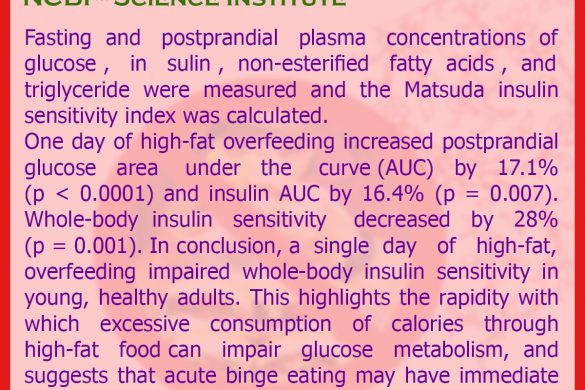Avoiding Overeating
قَالَ النَّبِيُّ ص إِيَّاكُمْ وَ الْبِطْنَةَ فَإِنَّهَا مُفْسِدَةٌ لِلْبَدَنِ وَ مُورِثَةٌ لِلسَّقَمِ وَ مُكْسِلَةٌ لِلْعِبَادَة
The Prophet Muhammad (PBUH) said: Refrain from overeating, since it will corrupt your body, bring about diseases and weakens your body for praying.
Bihar-al-Anwar, Vol. 63, page 338; Mustadrak-ul-Wasail va Mustanbat –ul – Masail, Vol. 16, page 210;
Scientific proof
Consuming excessive amounts of energy as dietary fat for several days or weeks can impair glycemic control and reduce insulin sensitivity in healthy adults. However, individuals who demonstrate binge eating behavior overconsume for much shorter periods of time; the metabolic consequences of such behavior remain unknown. The aim of this study was to determine the effect of a single day of high-fat overfeeding on whole-body insulin sensitivity. Fifteen young, healthy adults underwent an oral glucose tolerance test before and after consuming a high-fat (68% of total energy), high-energy (78% greater than daily requirements) diet for one day. Fasting and postprandial plasma concentrations of glucose, insulin, non-esterified fatty acids, and triglyceride were measured and the Matsuda insulin sensitivity index was calculated. One day of high-fat overfeeding increased postprandial glucose area under the curve (AUC) by 17.1% (p < 0.0001) and insulin AUC by 16.4% (p = 0.007). Whole-body insulin sensitivity decreased by 28% (p = 0.001). In conclusion, a single day of high-fat, overfeeding impaired whole-body insulin sensitivity in young, healthy adults. This highlights the rapidity with which excessive consumption of calories through high-fat food can impair glucose metabolism, and suggests that acute binge eating may have immediate metabolic health consequences for the individual.
https://www.ncbi.nlm.nih.gov/pubmed/28758920
Authors:
1-School of Sport, Exercise and Health Sciences, Loughborough University, Loughborough,Leicestershire LE11 3TU, UK. S.Parry@lboro.ac.uk.
2-School of Sport, Exercise and Health Sciences, Loughborough University, Loughborough, Leicestershire LE11 3TU, UK. R.M.Woods@lboro.ac.uk.
3-Oxford Centre for Diabetes, Endocrinology and Metabolism, University of Oxford, Churchill Hospital, Oxford OX3 7LE, UK. leanne.hodson@ocdem.ox.ac.uk.
4-School of Sport, Exercise and Health Sciences, Loughborough University, Loughborough, Leicestershire LE11 3TU, UK. c.j.hulston@lboro.ac.uk.




